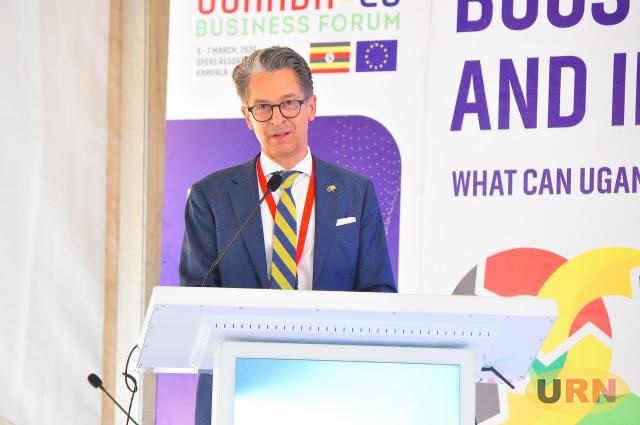
Kamapala, Uganda | THE INDEPENDENT | The Housing Finance Bank (HFB) of Uganda and EIB Global on Thursday announced a partnership to avail over two hundred and twelve billion (€50 million) investment to support private sector entities, notably SMEs in Uganda.
At least half of the investment to be allocated to women-led or women-owned enterprises. The EIB financing is part of the €200 million ACP Gender Finance Facility which aims to provide financing across Africa, Caribbean and the Pacific. EIB global is part of the European Investment Bank.
The EIB was the first multilateral lender to sign on to the 2X Challenge Criteria. This criteria requires that the EIB offer at least 30% of its investment support to businesses that are 51% of owned by a woman; a business founder is a woman; 30% of the senior leadership or Board composition is by women; 30-50% of the workforce is women; or the company offers services or products that specifically or disproportionately benefit women.
The EIB and HFB jointly agreed, in line with the recommendation of the European Commission, to raise the 30% threshold of loans allocated to businesses to 50% as a mark of their commitment towards the enhancement of the socio-economic conditions of women.
The European Investment Bank (EIB) Head of the Regional Hub for East Africa, Edward Claessen said signing this partnership ahead of International Women’s Day celebrations in Uganda re-emphasises their continued strong support in the way of entrepreneurship and business development for all entrepreneurs, more so women.
“We are committed to supporting projects and investments that empower women worldwide and address the systemic gender inequality in accessing capital,” said Classen.
Housing Finance Bank CEO, Michael Mugabi said the Bank is keen on strategic partnerships with like-minded entities and the shared purpose to contribute to the socioeconomic development of Uganda through enabling micro, small and medium enterprises (MSMEs) especially those owned by women.
“The Bank has a wide range of affordable solutions to drive this agenda which continues to form a significant part of our 2023- 2027 strategic plan. The new line of credit to HFB and a technical support grant will be used effectively to improve the capacity of women business and MSMEs in general,” he added.
Housing Finance Bank has previously worked with the EIB having signed an investment partnership of €13 million back in 2014 under the East and Central Africa Private Enterprise Finance Facility project.
HFB ranks as the 9th largest commercial bank in Uganda by asset size out of 25 commercial banks and focuses on consumer banking, business banking and housing finance.
Currently, Housing Finance Bank (HFB) operates through its head office and 18 branches with 9 branches in Kampala.
The HFB customers who will be enlisted into the project will also benefit from technical assistance under the African Women Rising Initiative delivered by the EIB.
Ambassador Jan Sadek, Head of the European Union Delegation to Uganda said the loan will contribute significantly to the objectives of the Team Europe Initiative ‘Sustainable Business For Uganda’ (SB4U) Platform and ‘Investing in Young Businesses in Africa’ (IYBA).
“It will promote employment via the financing of Micro, Small and Medium Enterprises (MSME) clients in the country, all of which will be female final beneficiaries,” added Sadek.
Apart from the partnership with HFB, entrepreneurs in Uganda also stand to benefit from the EIB’s SheInvest initiative launched in 2019, which commits to mobilize €2 billion of gender-responsive investment across Africa, focusing on empowering female-led businesses.
In addition to its public sector lending to governments, the EIB recognises that strong financial intermediaries are key to addressing market challenges and suboptimal investment situations across the continent.
EIB Global is building on its many years of experience and partnership with banks, microfinance institutions and equity funds by supporting their efforts to innovate and enhance the scope and financial inclusiveness of their outreach.
It also considers non-banking financial institutions, such as guarantee funds, leasing companies or fintechs, that have a financial model to enable greater outreach to underserved smaller businesses.
The EIB in partnership with the various financial institutions in Uganda has provided over €346 million in the past to support private sector businesses, targeting agriculture and gender thematic sectors.
Accompanying technical assistance was also offered to these banks or microfinance institutions and their clients across a wide range of topics including risk management, product development, environmental and social assessment, financial literacy among others.
The operation has a special gender focus with an aim to enhance women’s access to finance by reserving at least half of the investment funds to be allocated to businesses owned and/or run by women, and/or employing and/or serving women, and to thereby generate higher developmental impact.
This is considered a significant intervention for the women customers of Housing Finance Bank through financing activities of micro, small and medium enterprises. Some of the critical sectors include agriculture, health, manufacturing, transport, trade, education, renewable energy, and clean water.
The project is aligned with Ugandan and EU priorities for the region as it aims to enhance inclusive growth and sustainable economic development through supporting women. Gender Inclusion is also at the core of the Uganda Vision for 2040 and availing better opportunities for women is one of the key drivers to reduce gender inequalities and unlock the socio-economic transformation of the country.
*******
URN
 The Independent Uganda: You get the Truth we Pay the Price
The Independent Uganda: You get the Truth we Pay the Price



